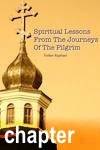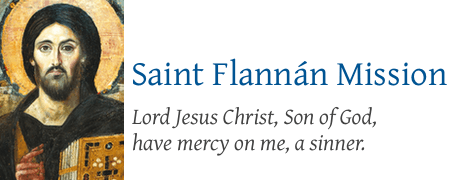 Do we spend “we” time with God every day, or even every breath? Do we, like Christ, take time off from tasks to pray in solitude to God?
Do we spend “we” time with God every day, or even every breath? Do we, like Christ, take time off from tasks to pray in solitude to God?
Dear beloved,
The pilgrim and the professor was about to bid farewell to the spiritual father at the monastery, when the pilgrim’s spiritual father said that a Moldavian monk and a hermit would like to meet and chat with both of them. So they stayed.
The pilgrim said that if he had sufficient money, he would have become a hermit too, as being a solitary is a tremendous blessing to Theosis without distractions. However, the professor’s view counter-balanced the pilgrim’s, that everything in life may appear to be good from a distance. There are always advantages, and disadvantages, especially if we take the time to dwell deep in it. The professor reminded the pilgrim that there were many hermits and ascetics who fell into egoistic delusions as well. The pilgrim concurred that to be true, as he had seen even those who experienced unceasing prayer of the heart fell into despair and abandoned their faith. Therefore, the lesson in life can be simple. Do we love God above ourselves, and that we recognize we are nothing without the salvation of Christ the Word, the comfort and guiding of the Holy Spirit, and the Divine Mercy of our Father above?
The hermit clarified and added to what both the pilgrim and the professor said, that if one chooses to be a hermit, it was absolutely important that one has a spiritual director to help one nurture and grow the faith and the inner prayer unto God, to prevent the ego and delusions from attacking oneself (Proverbs 13:20, 1 Thessalonians 5:14). This advice holds true for the faithful like us, who are deep in the world, in touch with communities, and yet sought the inner prayerful life towards Theosis with God, as we too, are solitaries when we pray in the closet (St Matthew 6:6).
“A true and knowledgeable spiritual director is necessary for the interior life. Sought one if one does not yet have one. But if one cannot be found, pray with tears to God, that the writings of the Holy Fathers can guide oneself, and to rely on the Holy Bible as the compass” – Saint Nicephorus the Hermit.
The hermit gave a profound teaching that is most illuminating in our search for God among His creation. He said that, when one seeks God with a true heart, one can find good useful advice from anyone. The hermit quoted that the Holy Fathers said that even if one turns to a Saracen (i.e. a non-believer) with faith in God and the right intention, even such a person can render valuable advice. Likewise, the Fathers said that if one turns to a Prophet without faith and right intentions, one will deride the Prophet and think his advice is useless. Therefore, let us consider, beloved, that God’s grace and mercy is above all that we can imagine. He is not confined or restrained by our microscopic minds, nor defined by us His full extent and possibilities of His salvation to be given to all His creation. He alone will and can decide how, when, and where He save any one of us (1 John 3:20, St Matthew 19:26). He will, as can be shown throughout human history, use ANYONE as His instrument for good and deliverance of His people. This is exactly why Christ commanded us above all things, to (1) love God, and (2) love others as ourselves.
The professor wondered if repentance would be the cure to preventing delusions in walking the inner prayerful life? The Moldavian monk suggested that the devil uses despair as a weapon against us when we pray in our dark nights, much as he would use pride against us when we think we are doing well. The monk quoted Saint Nikitas Stithatos that even if one falls into deep hell, one must never despair, but turn to God and God will restore our strength to carry on, out of hell.
The professor then wondered if a solitary life has any use to the community at all. This is a frequent question we are asked by non-Orthodox (and non-Roman Catholic) faithful. The hermit gave some insights. He said that a hermit does not lead an idle and meaningless life, since he is actually more active than one who is deep in the world. How so? The solitary has to function above his rational self, and has to keep vigil over his being the whole time, observing, logging, analyzing, and praying, all the time. This mental and spiritual activity is much more difficult, especially to maintain on an unceasing manner, than one who is deep in the world, doing many chores. To coin a secular paradigm, a hermit uses many CPU cycles (the central processing unit that is the “heart” of our modern computers) in any one second, than many of us do.
The solitary also shares his insights and findings with us in the world, either by writing (if he observes strict silence), or by occasional conversation. This builds and nurtures us who are in the world, spiritually. And if the solitary leads an exemplary and illuminating life, such a person also serves to inspire the rest of us to lead a faithful life towards God. This is akin to being a lamp to our darkened lives, certainly an important proposition especially in today’s clouded and darkened world.
The pilgrim added that even our Lord Jesus Christ stopped teaching or healing others sometimes, and walked away to pray in solitude (St Matthew 14:23, St Luke 6:12).
“Silent solitude is the mother of prayer. It returns one from the imprisonment of sin and allows a subtle growth in virtue, and a slow and steady climb to heaven” – Saint John Climacus (of the Ladder).
Are we spending a “we” time with God daily (Proverbs 8:34, St Luke 9:23)? Or even on a breath-by-breath basis? Every breath we take, in between chores and tasks that demand much of us, do we spend time with God, in inner solitude and silence in the world?
Let us pray, and spend time with God:
“Lord Jesus Christ, Son of God, have mercy on me, a sinner.”
Book Index | Prev: God’s love transcends | Next: Praying for others
